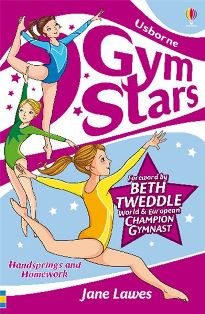Article
5 min read
Edited
8th October 2020
Writing advice is a difficult thing to give; what works for one person won’t necessarily work for anyone else.

So instead of advice, here are some of the things I learned while writing my first series, and some things I wish I’d known from the beginning.
- Write what you want to read. When I wrote the first Gym Stars book, I didn’t really set out to write a series. I was just trying to write the book I’d wanted to read when I was a gymnastics-mad child. And of course, what I’d really wanted to read when I was that age wasn’t just one book about a gymnast but lots of books about a gymnast!
- Love your setting. The setting of a gymnastics club naturally lends itself to a series because there’s a set of characters who regularly spend time there and there are lots of different things that can happen – competitions, injuries, gymnastics displays, arguments with friends. I found that, once I’d started writing, I kept coming up with more and more ideas of things that could happen to Tara and her friends, and by the time I’d finished, I had ideas for a few more books in the series. Whether it’s a gymnastics club, a football club, a school, Brownies or Scouts, your setting needs to be somewhere that children will want to keep returning to again and again.
- Love your characters. Similarly, the main character has to be someone who becomes the reader’s friend and who they want to spend more time with. If you’ve got the setting and characters right, you can keep throwing them different stories to deal with and watch your world come to life.
- Focus on Book One. I read some advice once on pitching to agents and publishers that said once you’ve sent your manuscript out into the world, instead of anxiously watching your inbox all day, get to work on writing something new. So when I’d sent out book one, I immediately got to work on Book Two while I was waiting. And then Book Three. By the time I’d got an agent, had meetings with editors and had the series commissioned, my plans and ideas for the series had totally changed and those two extra books I wrote never got read by anyone but me.
- When it comes to pitching a series to an agent or a publisher, the first book is the most important. It’s much better to put all of your effort into writing one really good book, and just sketching out a few ideas for further stories, than writing the whole series. Chances are your ideas will change a lot, anyway, so your time is better spent making the first book as good as it can be. Include lots of detail on the setting and give your character a story that helps him or her jump off the page, and hopefully everyone who reads it will want to come back for more.
- Remember the past. Once my series was commissioned and I got really stuck into writing (and re-writing, and re-writing), the thing I found the most difficult was explaining things that had happened in a previous book so that readers could enjoy the second or third book without having read the first one, while making sure that the explanation wasn’t boring for children who had read the first book. One way of getting around this that I learned is to have characters talk about things that have happened: “Remember when…?”, “This is like that time…” That way, you can explain bits that readers might have missed, as well as showing how your characters feel about them. They might be laughing at a happy memory, or shuddering while thinking about a scary experience – either way, hopefully your readers will want to go back and read what they’ve missed out on!
- Make lists. The other thing I found difficult was keeping track of small characters who might appear in only one scene per book, or little details about the world – I’d find myself writing book three and having to check back in book two to find out the name of Tara’s science teacher, or what lesson she had first thing on a Monday morning. If I could go back and do it all again, I’d definitely keep a list of that kind of thing right from the beginning!
Writing a series of books was a huge learning experience and I’m keeping all of these things in mind as I write my second series, Ballet Stars. I thought that, having learnt so much, I might not come up against these problems this time around…but so far all that means is that I’m encountering different problems instead!
To find out more Janes Lawes, take a look at her website. Jane's Gym Stars series is published by Usborne and you can find out more about it here.
Writing stage
Comments